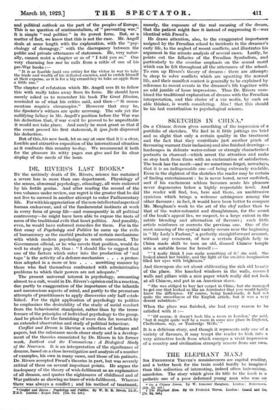DR. RIVERS'S LAST BOOKS.*
BY the untimely death of Dr. Rivers, science has sustained a severe loss in more than one department. Physiology of the senses, abnormal psychology, ethnology, all were endowed by his fertile genius. And after reading the second of the two volumes under review, our regret is the greater that he did not live to succeed in another attempt to enter Parliamentary life. For with his appreciation of the non-intellectual aspects of human endeavour, and of the fundamental instincts at work in every form of group life—and consequently in all political controversy—he might have been able to expose the roots of some of the traditional evils that beset politics. And possibly, even, he would have enforced remedies for them. For in the first essay of Psychology and Politics he sums up the evils of bureaucracy as the morbid products of certain mechanisms with which modern psychology is much concerned. The Government official, or he who covets that position, would do well to study page 20, thus : "I should hire to suggest that one of the factors which enter into the production of 'red tape "is the activity of a defence-mechanism . . . a protec- tion adopted in a more or less . . . unwitting manner by those who find themselves confronted with administrative problems to which their powers are not adequate."
The present universal interest in psychology, amounting almost to a cult, would in Dr. Rivers's opinion eiad in a reaction, due partly to exaggeration of the importance of the infantile and unconscious aspects of mind, and partly to the premature attempts of practitioners to apply discoveries only half estab- lished. For the right application of psychology to politics he emphasizes the desirability of the study of social conduct from the behaviourist standpoint, rather than by the trans- ference of the principles of individual psychology to the group. And he pleads for the furnishing of more data for research by an extended observation and study of political behaviour.
Conflict and Dream is likewise a collection of lectures and papers, but the substance needs closer study and is a develop- ment of the theories enunciated by Dr. Rivers in his former work, Instinct and the Unconscious : A Biological Study of the Neuroses. It is an interpretation of the significance of dreams, based on a close investigation and analysis of a number of examples, his own in many cases, and those of his patients. Dr. Rivers accepted Freud's theories in part, but was severely critical of them on several important points. He argues the inadequacy of the theory of wish-fulfilment as an explanation of all dreams, and quotes the nightmares of childhood and of War patients as showing no trace of wish-fulfilment. Whereas there was always a conflict ; and his method of treatment, • Conftict and Dream : Psychology and Polities. By W. IL IL. Rivers, LL.D., Y.B.S. London: Began Paul. [128. Od. net.1
namely, the exposure of the real meaning of the dream, that the patient might face it instead of suppressing it—was identical with Freud's.
He draws attention, also, to the exaggerated importance assigned by the Freudian school to incidents in the dreamer's early life, to the neglect of recent confficts, and illustrates his argument in the minute analysis of several cases. Lastly, he points out the fallacies of the Freudian Symbolism, and particularly to the overdue emphasis on the sexual motif which can be felt throughout all the utterances of the school. To sum up Rivers's theory of dreams : there are attempts in sleep to solve conflicts which are upsetting the normal life, and their manifest contest is generally to be explained by reference to recent events in the dreamer's life together with an odd jumble of loose impressions. Thus Dr. Rivers com- bined the traditional explanation of dreams with the Freudian interpretation, and this choice of a via media, by such an able thinker, is worth considering. Alas ! that this should be his last contribution to psychological science.










































 Previous page
Previous page